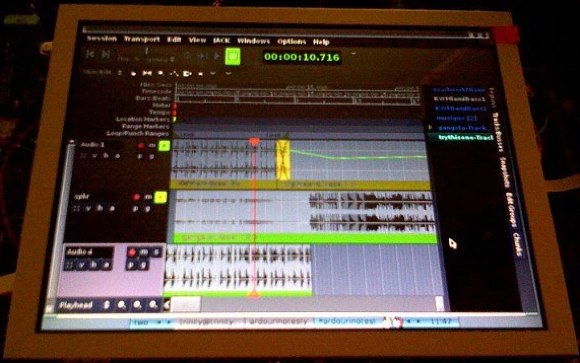
For mobile work, your choices have traditionally come down to one of two choices: either lug your laptop and audio interface, or get dedicated recording hardware with far fewer capabilities. We’ve been following the evolution of the Linux-powered Trinity mobile recorder for over a year now because we’re interested in what could happen between those two extremes.
Prototype Trinity recorders initially failed to impress on the software side: the bundled software focused on Audacity 2.0, a fairly basic waveform editor. That already allows far more than what’s possible with dedicated hardware recorders, but maybe not quite enough to warrant leaving your laptop at home. Since we last saw it, though, the Trinity has gotten two major improvements. First, it’s not naked any more; it’s got a lovely, brushed aluminum case. More importantly, though, it’s got an application worth writing home about: a new, mobile/embedded edition of the powerful, free DAW Ardour called Ardourino.

Ardourino isn’t just Ardour running on the Trinity: it’s a special, customized version of the DAW intended for mobile devices. You get the capabilities of Ardour, a full-featured open source DAW that also runs on desktop Mac OS X (natively, no less) and Linux, but adapted to smaller screens. That shows some promise for the open source audio software; I can’t think of any other major pro audio software that’s mobile device ready. And, of course, that also means you can work directly on your desktop DAW on the road, without any import/export of files.
Since the Trinity is running Linux, other applications are possible, too; one prototype photo already shows it running the Hydrogen drum machine.
For many readers, the Trinity rightfully has competition from laptops; you may just not want another device. Nonetheless, though, the Trinity provides an interesting glimpse at what the future of mobile/embedded audio devices might look like, and some of the potential of Linux for music and audio. As far as the Trinity itself, we look forward to learning more about the finished project.
Ronald Stewart’s Blog on the Trinity (and other Linux audio musings)
Previously:
Linux-Powered Mobile Trinity DAW in the Wild
Portable, Linux-Based Trinity Recorder Development Continues; New Specs